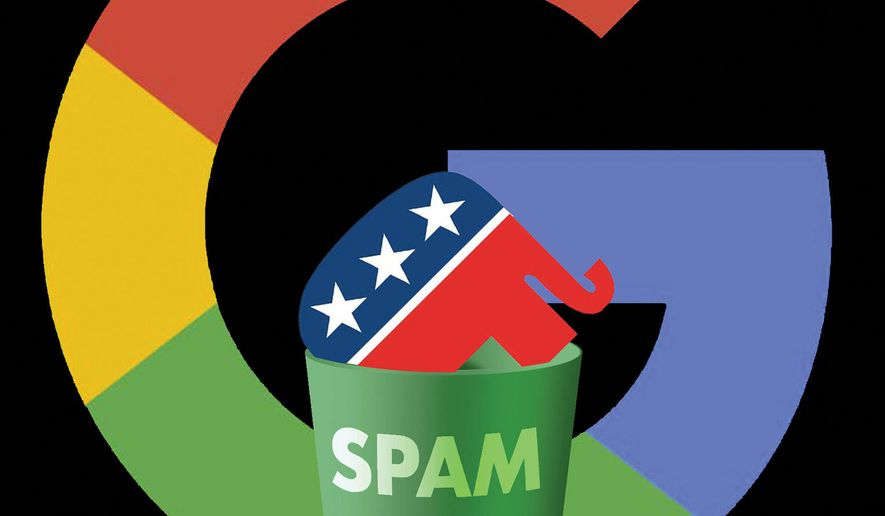OPINION:
Google wants conservatives to believe it has suddenly found religion on political neutrality. Don’t buy it.
The same company that told you the Founding Fathers were “Maori Warriors in powdered wigs” claims, as of Monday, that it is suddenly done sending Republican campaign emails into spam folders. This isn’t reform; it’s a smokescreen. If the Federal Trade Commission falls for it, Big Tech will walk away unscathed while Republican campaigns keep bleeding small-dollar donations and losing direct access to their voters.
Republicans have been raising alarms about this for years. In 2020, Rep. Greg Steube of Florida asked Google CEO Sundar Pichai why emails to his own family from his campaign were consistently going to spam or not even being delivered. Mr. Pichai shrugged off the question. Two years later, an independent study from North Carolina State University examined more than 300,000 campaign emails and found Gmail routed the overwhelming majority of Republican emails to spam. As for Democratic appeals, they reached inboxes — a clear anti-conservative double standard.
The public pressure was so bad that Google pretended to repent within two years. In 2022, under fire from Sen. John Thune and House Republicans, the company floated a “pilot program” to let campaigns bypass spam filters. Conservatives quickly pointed out it was a phony fix: window dressing without real accountability. By early 2023, the tech behemoth had scrapped the pilot altogether. Meanwhile, conservative emails kept going to spam.
What happens, or doesn’t, on email has real-world consequences for our two-party system. Amid Google’s blockade, small-dollar Republican fundraising slowed to a trickle. This makes sense: When end-of-quarter appeals vanish into spam, millions of dollars in donations never materialize. That’s not an inconvenience; it’s election interference by algorithm.
Fast-forward to this summer, when a leaked memo showed Gmail labeling emails containing WinRed donation links as “suspicious” and sending them directly to spam, while ActBlue links sailed into inboxes. Video evidence confirmed the disparity. Only after these revelations did Google admit it had been relying on a third-party blacklist.
Google is now saying the blacklist is gone and the problem is solved — nothing to see here — but the company “fixed” only what it got caught doing. It hasn’t addressed the broader issue: Republican emails are still disproportionately filtered, suppressed and lost to the spam folder.
Because Google refuses to come clean and do what’s right, the Federal Trade Commission must hold it accountable. FTC Chairman Andrew Ferguson has made clear that political censorship by Big Tech platforms falls squarely within the commission’s mandate. He warned in August that companies cannot “censor Americans or weaken their data security at the behest of powerful interests.” The commission has already opened the door with its Big Tech censorship inquiry. The first order of business should be investigating Google’s censorship of conservatives.
Election integrity is on the line. If Google systematically disadvantages one political party’s communications with voters and donors, it undermines the democratic competition that defines our electoral system. Whether by design or “accident,” the effect is the same: One party has clear access to inboxes while the other fights uphill.
Google wants the FTC to take its word and move on, but conservatives cannot allow that. A true fix is not a press release or a one-off tweak to a blacklist. The FTC should require real transparency and accountability. We must know the reason for this disparity. Anything less leaves the fox guarding the henhouse.
Equal treatment of WinRed and ActBlue must also be nonnegotiable. The unequal treatment must end now.
Campaigns deserve visibility into how their emails are being filtered. Google should provide transparent dashboards that explain why a message has been flagged, how deliverability is being affected and what recourse exists to correct the problem. Finally, these standards must be enforceable, with real penalties if discrimination persists, so Big Tech cannot simply shrug off concerns once public pressure fades.
This is especially important because of Google’s extensive control over other aspects of our lives. Beyond its forays into email, search, artificial intelligence and driverless cars, Google is a gatekeeper through YouTubeTV and YouTube, which all too often use algorithms or market power to suppress conservative content.
Until these reforms are in place, Republicans should assume the world’s most powerful tech company is still tilting the scales against them. Mr. Ferguson and the FTC now have the chance to prove that Big Tech doesn’t get a free pass to manipulate American politics. It doesn’t matter what Google now says. After years of lying and hiding the truth, all that matters is the FTC shining a light on what Google really does. Electoral fairness demands nothing less.
• Matthew Kandrach is president of Consumer Action for a Strong Economy.




Please read our comment policy before commenting.